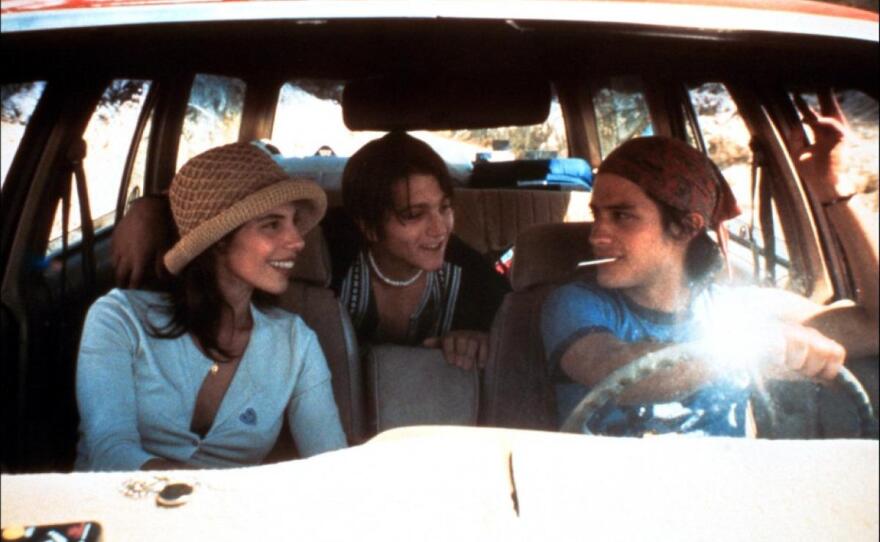Guest blogger Rebecca Romani looks back on the 20 years of Latino cinema highlighted at the San Diego Latino Film Festival.
In the past two decades of the San Diego Latino Film Festival’s existence, Latino film has grown and expanded both in the types of films produced and in distribution. From films that seemed destined for a limited, Spanish-speaking market, Latino-themed films and Latino actors have crossed over into mainstream venues, due, in part, to a growing Latino population of immigrants and US-born viewers who increasingly define themselves as bi-lingual and bi-cultural. With a Latino population now pegged at over 16% nationally and just over 38% in California according to the U.S. 2010 Census, there has been plenty of room for Latino film to grow in scope and sophistication.
To mark these past twenty years, the SDLFF has brought back some major films from across the Latino world, with what are now major stars and internationally known directors.
From the years the SDLFF started, 1993, come two films that represent major movements in Latino Cinema. Most people may remember Mexican Director Guillermo del Toro’s “Pan’s Labyrinth, “and his interest in magical realism and stories with a twist. But where did this start? Probably with “Cronos,” Del Toro’s directorial debut about an antique golden mechanical beetle which can confer immortality on its owner, but, as in many Del Toro movies, at a terrible price. You can see “Cronos,” on Thursday 3/14.
The other film from 1993, comes courtesy of one of the more prolific cinema producers in Latino America, Cuba. “Fresa y Chocolate” ("Strawberries and Chocolate") is one of the classics of modern Cuban Cinema, combining as it does, the daring themes of Gay life and a very typically Cuban sharp commentary on politics and Cuban society. You can catch this gem of Cuban Cinema also on Thursday, 3/14.
Independent Latino Cinema in the US got a big boost from an unexpected place- Quintin Tarantino, who saw in fledgling director Robert Rodriguez (“El Maricahi’), a raising talent able to combine, action, raw energy and unexpected endings. The SDLFF showcase highlights Rodriguez’s 1995 quirky hit “Desperado," which brings together a number of names who have gone on to careers of remarkable depth as actors and producers: Selma Hayek, Antonio Banderas, Danny Trejo and Cheech Marin.

Spain is well-represented in this year’s anniversary showcase by two works starring the stunning Penelope Cruz, the darling of Spanish Cinema, and the muse of Spanish director, Pedro Almodovar. You can catch Cruz in one of her earliest leading roles in the Spanish classic, “Abre Los Ojos,” (1997), the story of a charming rake, Cesar, whose pursuit of women and fun is brought to an abrupt halt by a disfiguring attack by an ex-lover. His desperate attempt to woo and win Sofia (Cruz), leads him to find a way to repair his looks. Cruz also stars in one of Aldomovar’s most thought-provoking films, “All About My Mother" (1999), in which Manuela loses her 17 year old son in a freak traffic accident as he dashes across the road to get an actress’ autograph. Faithful to typical Aldomovar films, gender-bending and experiences that broaden characters’ outlooks abound as Manuel seeks out her son’s now transvestite father. You can catch “Abre” March 14-15 and the Almodovar film this Wednesday, March 13.
What Latino film festival would be complete without an entry from one of Latin Cinema's most prolific and experimental producers, Brazil? Brazil burst onto the cinema scene with the daring and brilliant films of Cinema Novo (“Dona Flor and Her Two Husbands”) in the 1960's-early 1980’s and has kept up a steady production of hard-hitting and well-directed hits ever since. Well-known Brazilian director Walter Salles weighs in with his 1998 film, “Central Station,” the story of a retired school teacher turned public scribe, who tries to reunite a boy, orphaned in a traffic accident, with any responsible family member she can find. This sensitive portrait of a cross-section of Brazilian society won numerous international awards the year it came out. International Brazilian hit, “City of God,” broke screening records for Brazilian films when it screened in 2002. An unflinching portrait of the growing violence in Rio de Janeiro’s favelas or slums, the film was a realistic portrayal whose likes had probably not been seen since Hector Babenco’s landmark film, “Pixote.” Like Babenco, director Meirelles uses local kids from the favelas as non-professional stars.
Tragedy and Chile are often synonymous, given Chile’s “Dirty War” waged on its citizens by the ruling junta in the 70’s and 80’s. Thirty years later, the fate of the desapercidos still hangs over Chile’s filmmakers. From Chile comes the stunning film, “Nostalgia for the Light,” directed by Patricio Guzman. Guzman intertwines the twin mysteries of Chile’s Atacama desert- the natural and the man-made- in a moving commentary on man’s need to visit the past to find the answers to the present in the stars (astronomers) and on earth (those disappeared in early 80’s the desert). “Nostalgia” shows on Friday, March 15.
The showcase stops next door for two Mexican features that were hits on both sides of the border, “Amores Perros,” (2000) and “Y Tu Mama Tambien” (2001). “Amores,” by Alejandro Gonzelez Iñárritu, catches the changing landscape of Mexico City as it started to fall into breathtaking criminality both publicly and politically in the tale of a horrific traffic accident that is really three stories in one. On a lighter note, “Y Tu Mama,” directed by Alfonso Cuaron, is a spirited search for an imagined beach that ends with its stars finding a Mexico that changes their lives forever. This film launched the careers of Gael Garcia Bernal and Diego Luna. You can travel Mexico on the last day of the festival, Sunday, March 17.
--Rebecca Romani is a guest blogger focusing on foreign films and film festivals.





